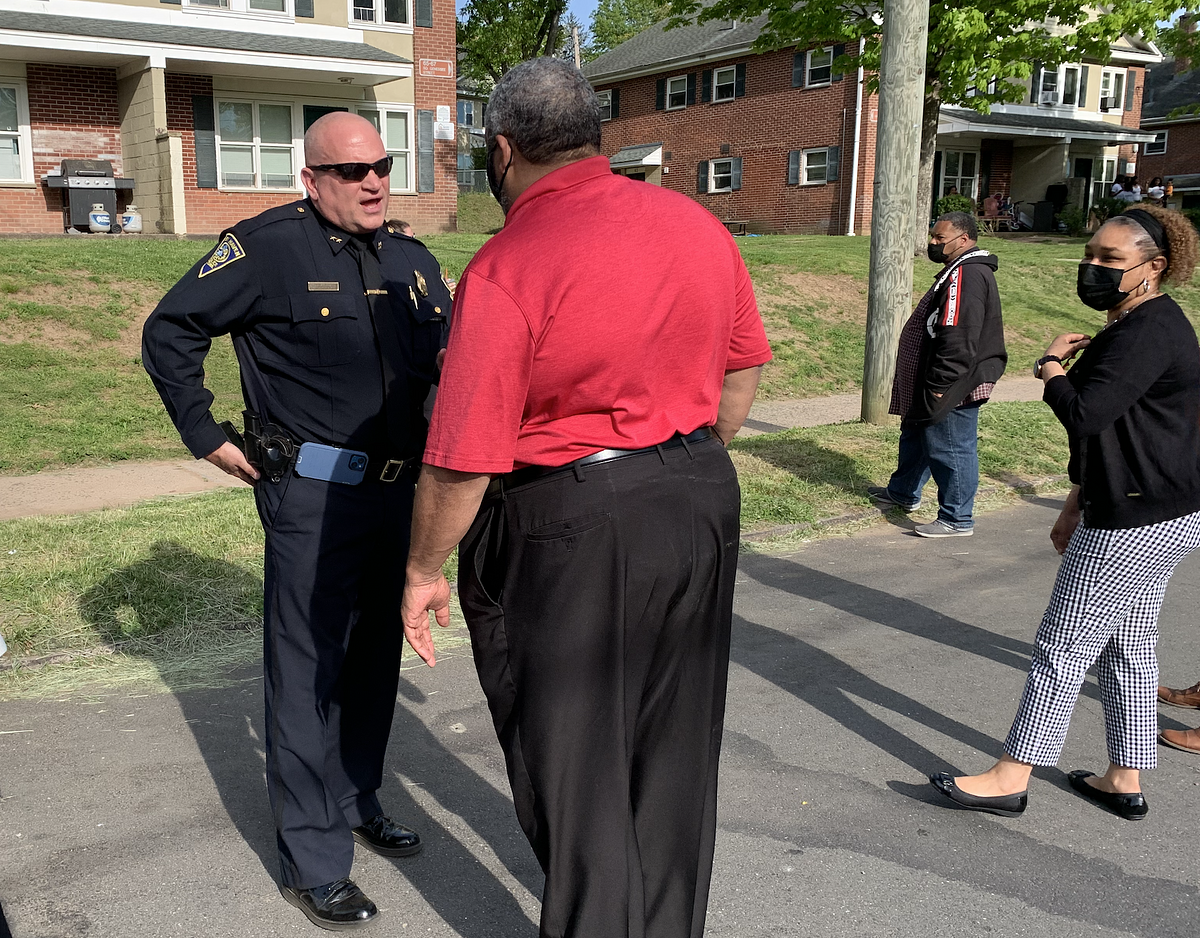
Paul Bass Photo
Jacobson at South Genesee Street vigil following murder of 18-year-old Anthony Strother, whom he knew and worked with.
Mayorally nominated next-Police Chief Karl Jacobson has two words he wants to bring to the beat: “procedural justice,” a way to build community trust and police legitimacy.
Jacobson touted that goal, and that fairness-centered criminal justice philosophy, as he seeks to step into the role of New Haven’s next permanent police chief.
Jacobson talked through his big-picture views on policing — as well as about his 24-year career in law enforcement, the current state of public safety in New Haven, and his plans for leading the city’s police department — during an interview Thursday on WNHH Radio’s “K‑Pasa” program with host Jose Candelario and fellow guest and community activist Rodney Williams.
Jacobson is currently the city’s only assistant police chief. He’s also on tap to become the city’s next top cop, now that Mayor Justin Elicker has formally submitted his name to the Board of Alders for confirmation.
An aldermanic committee is slated to hold a public hearing on Jacobson’s nomination for police chief later this month. The full Board of Alders will likely then take a final vote on the matter in early July. (Click here to read a previous Independent article about Elicker’s nomination of Jacobson, and an overview of his 15-year career in the New Haven Police Department.)
During Thursday’s WNHH radio interview, Jacobson — who recently earned a master’s degree in criminal justice at the University of New Haven, where one of his fellow classmates was his daughter Kelli — broached the theory of “procedural justice” when discussing the role that police officers should play in ensuring a fairer, safer city.
It has do with looking at every interaction police have daily with citizens as an opportunity to gain trust and be seen as upholding the values of the badge.
“Procedural justice” is a criminal justice theory that argues that fairness and dispute resolution are key to successful, legitimate law enforcement. It promotes public input, transparency, and dignity as central to police forces that want to build trust among the communities they serve. The theory has been developed and championed by Yale Law School Professor Tracey Meares, a nationally celebrated police reformer who is also a member of New Haven’s Board of Police Commissioners.
“What I want to build my administration on, and I mean that as the administration towards the cops and the administration towards the community, is legitimacy,” Jacobson said during the radio interview.
“If I have legitimacy with the officers, we’re all gonna move in the right direction. If the officers have legitimacy with the community, then we move in the right direction.”
That’s where the tenets of “procedural justice” come in, he said.
First, police officers need to give “someone a voice. You show up at a call, and you listen.”
Second, police officers need to treat everyone they interact with, including suspects of crimes, with dignity.
Third, police officers need to prioritize “fairness in decision making. You take as an officer both sides of the story, and you make sure that everything’s documented.”
With those goals in mind, Jacobson said, “trust is built.” And with greater trust between officers and the communities they serve comes a safer city, he said.
“If you have legitimacy with the community, there’s data that shows they actually adhere to the law. So you have less crime, and on top of it, the good people feel like the cops are good, and they tell you what happened. Therefore we solve more shootings. We solve more homicides. We solve more robberies. And we keep people safe. That’s the basis of it.”
How might he go about building that community-police trust if confirmed as the city’s next police chief?
Jacobson also spoke about building up the city’s Police Activity League (PAL) in a bid to “start engaging kids at fourth, fifth grade” to encourage positive relationships between young people and police officers, and ultimately encourage young New Haveners to aspire to becoming a city police officer when they grow up. He said he’d like the program to expand from just summer camp to a year-round effort.
And he spoke about keeping the emphasis during his hoped-for tenure as police chief not just on data, not just on the number of arrests and shootings, but also on “outcomes. How does the community feel when you leave?”
“I taught a lot of stuff in our police academy,” he said. “And I always said: When you drive to that house and you get out, it could be for a broken window or it could be a terrible domestic or it could be a murder, the way you treat those people will stick with them and they will believe that police are all like that. So, as each individual cop, you have an opportunity to change how the next outcome comes with the next cop.”
Click on the video above in the article to watch Jacobson’s full radio interview.




Good luck to Chief Jacobson who will hooefully get appointed Chief w/o controversy.
It is a police officers job to listen to complainants, witnesses and victims of crime. In the majority of routine calls for service this is easy to accomplish by the officers assigned.
There are calls that are dynamic in nature and events are fast moving. Four chases, active robberies, burglaries and thefts are just a few. In those situations there is scant time to engage in dialogue because the incident has to be stopped and addressed. Good idea but hard to put into practice when it hits the fan.